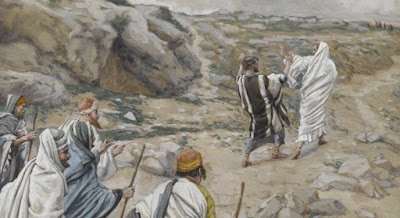Readings: Eccl 11:9 -12:8; Ps 90; Lk 9:43b-45
While
they were all amazed at his every deed, Jesus said to his disciples, “Pay
attention to what I am telling you. The Son of Man is to be handed over to
men.” But they did not understand this
saying; its meaning was hidden from them so that they should not understand it,
and they were afraid to ask him about this saying [Lk 9:43b-45].
-----------------------------
My eighth-grade class was quite large, probably about 40 children. And Sister Francis Jane, our teacher, handled us with a near-perfect blend of discipline and love. She was a tiny woman, and the oldest of the Dominican nuns who taught in our school, but she kept us in line and insisted that we learn.
She also had a clever method of getting our attention in class. As she taught, whether she was speaking to us or writing something on the blackboard, she would occasionally rap her desk twice with one of those bony knuckles. This was a signal that what she was speaking about or writing would be on the next test. I quickly discovered that if I took note of these signals – in other words, if I paid attention – I could easily ace the test.
Well, dear Sister Francis Jane always comes to mind whenever I read this brief Gospel passage from Luke. Jesus turned to His disciples and said, “Pay attention to what I am telling you” [Lk 9:44].
Jesus was shaping the apostles, teaching them to understand the depth of the Paschal Mystery, both in His life and later in their lives. Yes, He wanted them to listen, because it would definitely be on the test.
Not long before, up in Caesarea Philippi, Jesus had made that first prediction, a three-fold prediction: He would be handed over to men, they would kill Him, but after three days He would rise from the dead. In Matthew’s Gospel we’re told that Peter challenged Jesus: “God forbid, Lord! No such thing will ever happen to you” [Mt 16:22]. But this was followed by that sharp rebuke from Jesus: “Get behind me, Satan” [Mt 16:23].
 |
| Get Behind Me, Satan! |
Peter and the others really didn’t have a clue about Jesus’ mission. Their vision of the Messiah didn’t coincide with what they heard from Jesus, because just like you and me, they thought in worldly terms. How did Jesus put it? “You are not on the side of God, but of men” [Mt 16:23]. In today’s passage from Luke Jesus predicts His passion for the second time; but this time, after getting their attention, He simply says: “The Son of Man is to be handed over to men” [Lk 9:44].
 |
| Delivered into the hands of men... |
Unlike His first prediction, this time there’s no shout of indignation from Peter; no, the response is very different. In Luke we’re told “…they did not understand…and they were afraid” [Lk 9:45]. But Matthew describes the Apostles’ response differently: “…and they were deeply saddened” [Mt 17:23].
And note that Jesus didn’t use the first person here. He didn’t say, “I will be handed over…” No, he says, “The Son of Man is to be handed over to men.” Yes, the Apostles were both afraid and deeply saddened because the Son of Man, the perfect One, will be betrayed by men – and not just by first-century Romans and Jews, but by all of us.
By rejecting God’s gift of faith, by betraying God, by killing God, who is one of us, it’s as if we all actually betray and destroy ourselves. It’s as if we see God as some sort of alien being; but that’s not how He came to us, is it? No, He came to us, not in difference but in sameness, as one of us, one of us in all things except sin. He came as a loving brother of the same loving Father.
And yet the world hates Jesus – and believe me, brothers and sisters – the world does hate Jesus. It hates Him because He shows us what we could be. And the world fights that, doesn’t it? Indeed, we fight it too – that call to conversion – and try to do away with the judgment under which we live. What did we hear in our first reading from Ecclesiastes? “God will bring you to judgment” [Eccl 11:9].
But only if we become like Him can we be on the side of God, not of men. Only if we change, only if we repent and accept conversion, can we become what He desires for us.
And so, in the overwhelming mercy of His divine plan of love, Jesus allows Himself to be delivered into men’s hands. He allows Calvary’s horrendous demonstration of violence and hatred. He allows it so that when men wound Him, when they nail Him to that Cross, they will be washed in the tide of His Blood. And the power of that Blood, the Blood of divine love, can overcome and erase any hatred that fills the human heart.
 |
| The Blood of Christ |
You see, brothers and sisters, once we accept the depth and breadth of God’s mercy, once we accept the forgiveness He desires for all, it’s easy to pay attention when He speaks to us.




